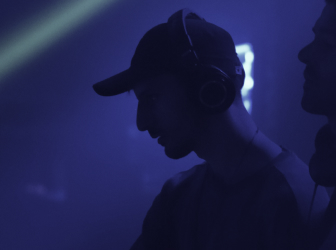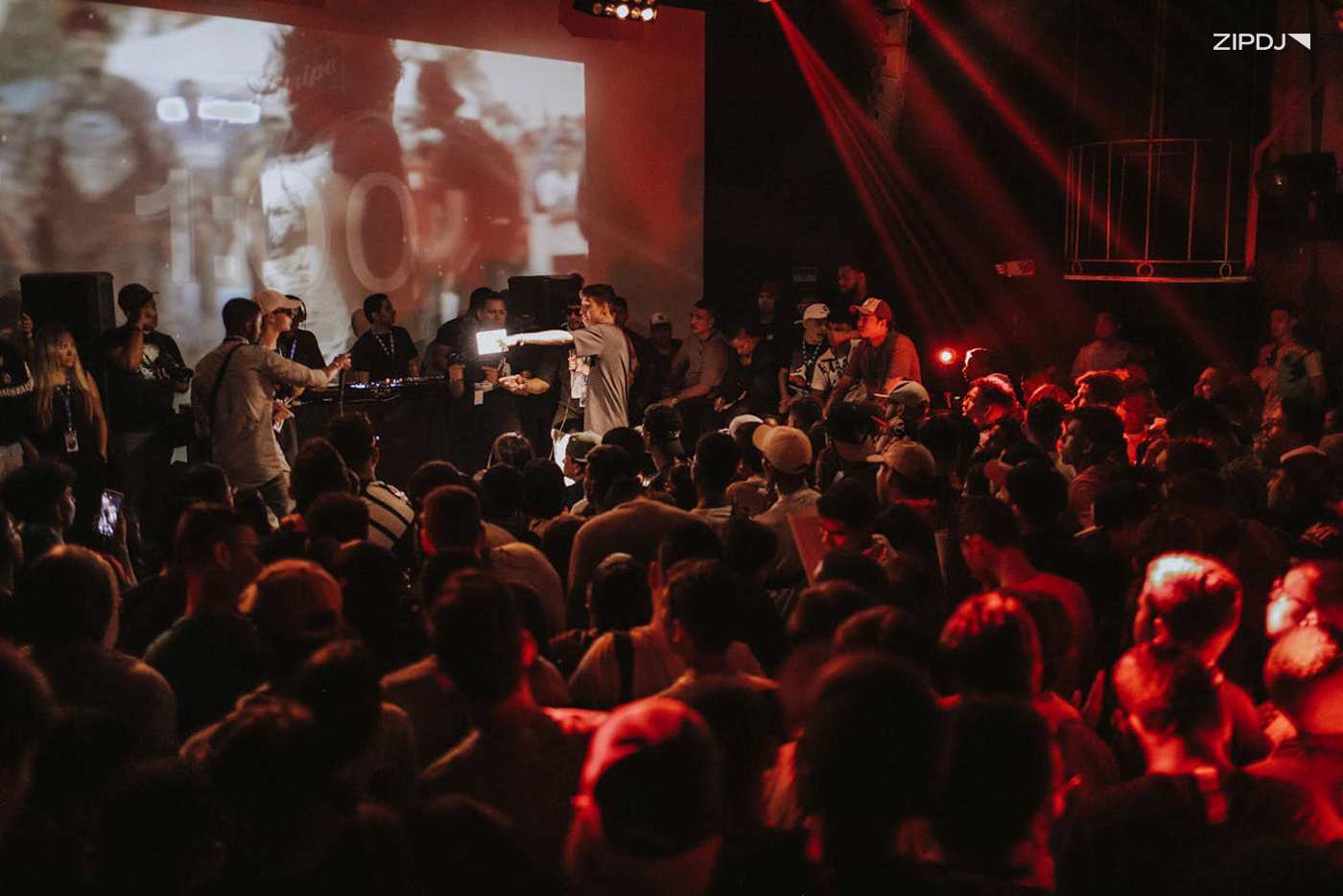The Ultimate DJ Proposal Template To Simplify Your Proposals

Becoming a successful disc jockey means taking a proactive approach to your career, whether working at corporate events or aiming for the club dance floor.
A DJ proposal is a great way to appeal to event organizers and showcase your DJing experience and track record of hosting events for clients.
In this article, we’ve created a DJ proposal template to help you take your career to the next level and impress event planners with your unique skills.

What Is A DJ Proposal?
With the DJ industry continuing to grow, competition for gigs is tougher than ever, making it challenging to get your foot in the door.
Writing a DJ proposal is an effective way to get noticed by taking a proactive stance on your services and contacting venue owners.
DJ proposals can be tailored specifically to particular booking agencies and other clients to demonstrate your understanding of their core needs.
It stands as a formal document for your professional brand, outlining the DJ services offered, the equipment you can provide, and your previous history of gigs.
You can also use a DJ proposal to provide links to your DJ website, where the potential client can view images, videos, and additional information.
If you’re learning how to make money as a DJ, setting up a comprehensive DJ proposal should be among your top priorities.
Using an easily editable DJ proposal template, you can make quick adjustments depending on the event organizer you aim to impress.
Learn more: Find out how to navigate the DJ industry.
DJ Proposal Template Example
To help you get started on the right foot, here’s a DJ proposal template you can use as a foundation for your next gig:
Introduction
[Dear RECIPIENT’S NAME,]
[Summary of services offered and proposed gig]
Brand Summary
[Introduce your DJ brand and style]
[Highlight your unique selling point]
DJ Services
[Brief introduction text]
[Bullet list of services:
- Event types
- Notable DJ skills
- Venue capacity/audience size experience
- Additional services, eg, MCing ]
Equipment Provided
[Brief introduction text]
[Bullet list of equipment:
- DJ controllers/mixers
- Sound systems/speakers
- Provided peripherals
- Lighting systems
- Optional extras ]
Client Testimonials
[Brief introduction text]
[Testimonial #1]
[Testimonial #2]
[Testimonial #3]
[Testimonial #4]
DJ Pricing & Packages
[Brief introduction text]
[General pricing]
[DJ package – basic level]
[DJ package – mid-tier level]
[DJ package – complete service]
Contact Information & Website
[Full Name]
[Phone number]
[Professional email address]
[City, State]
[Professional website]
[Social Media Accounts]
How To Create The Ultimate DJ Proposal Template In 10 Steps
Now that we’ve covered the basics of a DJ event proposal and provided you with a template, it’s time to address each section in more detail.
While your DJ proposal will vary depending on the nature of the gig, these rules are broadly applicable to everything from wedding receptions to corporate functions.
Step 1: Address The Recipient Directly
The first step in crafting your DJ proposal is to address the intended recipient directly at the beginning of the document.
While using a boilerplate template and opening with a generic “Dear sir/madam” can be tempting, this won’t leave a good first impression.
As with writing up a DJ resume, you should use their name in the opening to indicate that you’ve researched and approached the correct point of contact.
Make sure you use a respectful tone in this section, applying their name to the cover letter so they appreciate your taking the time to find out who they are.
Tip: Find out how to organize your DJ playlists and crates.
Step 2: Summarize Your DJ Services & Brand
In the next section of your DJ proposal, you should briefly outline who you are as a DJ and the type of DJ services you’re offering the potential client.
This section is a great place to showcase your DJ brand, the style of music you’re focused on, and the type of events you provide services for.
You can include some basic background information about your history in the profession and a summary of some of the DJ venues you’ve performed in here.
Brief information about your other skills and achievements as a professional DJ can also be summarized here.
The critical aspect of this summary is its purpose: to share the unique selling points that set you apart from the other DJs you’re competing with.
Showcasing your ability to get the party started and engage with the audience will encourage the recipient to want to learn more about your services.
Step 3: Outline Your Services In Detail
With a summary giving potential clients a taste of what you offer, it’s time to dive into the details and cover your services in more detail.
This is your chance to shine through and demonstrate your grasp of the art of DJing and why event planners should consider hiring your services.
If you’re a corporate event DJ, you can outline the basic itinerary of your events and how you allocate time for keynote speakers and other relevant activities.
Alternatively, if your DJ proposal is aimed at nightclubs or other entertainment venues, this is the opportunity to demonstrate your knowledge of such events.
This section can also include more in-depth information, such as your primary music genres and core target audience.
If you’re familiar with new DJing technology, be loud and proud about these skills and demonstrate your ability to stay relevant as a DJ.
The same applies to your technical prowess, so if you’re an impressive scratch DJ or multi-deck mixer, make sure your proposal mentions these facts.
Learn more about a ZIPDJ subscription.
Step 4: Include Any Relevant Soft Skills
Having covered your core services and other relevant information on your ability to perform advanced DJ techniques in the previous section, it’s time to move on to soft skills.
DJing is a highly interpersonal profession that requires great people skills and the ability to communicate clearly, and your proposal should reflect these aspects.
This begins with your knowledge of DJ etiquette, and the do’s and don’ts of liaising with venue managers and bar staff during a gig.
It also covers your ability to present yourself appropriately to customers, particularly if you DJ formal events such as wedding receptions.
If you’re submitting a proposal for a club event and have a following of loyal fans who are likely to attend, ensure this information is also included.
You can also mention your DJ time management skills, such as your ability to turn up early for sound checks and stay late to help pack away equipment.
Step 5: List Your Available Equipment
With your DJ style, ability, and relevant soft skills outlined, the next section in your DJ proposal should cover any equipment you can provide.
If you aim to get a gig in a dedicated dance music venue, this information may be less relevant than other DJing styles.
This is especially important if you’re promoting a mobile DJ setup, in which case the event organizers will want clear details about what you provide.
Outline your DJ controllers, available speaker systems and accessories, and any optional extras you include, such as lights and microphones for announcements.
If you’re invested in high-end professional equipment, include the make and model of the gear so the owner can check to see if it’s up to scratch for the venue.
You should also be clear about your level of knowledge about your equipment and your ability to use it to the full extent of its capabilities.
This includes explaining your understanding of the latest trends in DJ equipment and how you incorporate this into your services.

Step 6: Share Testimonials & References
Social proof is a powerful tool for all businesses, and a critical concept marketing professionals use to demonstrate their track record to potential customers.
As such, it is a firm place in any DJ proposal that wants to impress the recipient and back up any claims with credible testimonials.
Whether you’re hoping to land a DJ residency or pitch for corporate events, testimonials from previous clients will increase your chances of success.
Testimonials offer credible insight into your ability to perform to the expected standards and properly entertain the event’s guests.
They can also confirm your ability to adapt to circumstances, such as updating your music style and managing last-minute changes.
Including multiple testimonials will further help to enhance your reputation as a reliable, professional DJ capable of maintaining consistent performance.
If you’ve had any media coverage for previous events, you can include these in this section, with relevant links to the media outlet’s articles.
Don’t forget to keep this testimonials section up to date as and when you complete further gigs throughout your career.
Read ZIPDJ’s glowing testimonials.
Step 7: Outline Your Pricing & Packages
Once the recipient has read through your proposed services and the equipment you can provide, it’s time to get down to the figures and explain your pricing.
As the cost of living has impacted many DJs, they need to ensure they’re being appropriately compensated for their time and effort.
This means researching the typical prices DJs charge in your niche to see what event planners are willing to pay.
Your level of experience and track record of success will play a large role in determining your DJ rates, which will be in accordance with the industry’s best practices.
Likewise, if you’re already a gigging DJ with paid gigs to your name, you can use these as a foundation for setting your rates moving forward.
Your prices will be more complex for wedding and mobile DJs since they also cover the various DJ equipment and accessories you provide.
If that’s the case for you, consider writing up a tiered selection of packages that stack up optional extras to give clients more options.
This could begin with a basic package that includes the DJ booth rig and lead up to a full package with lights, photo booths, and other event features.
Learn more: Discover the average DJ prices worldwide.
Step 8: Link To Your Website
While an excellent DJ proposal should aim to cover all the core information venue owners will be interested in, it should nevertheless strive for concision.
By including a link to your professional website, you can give the recipient access to a wealth of additional resources to help them decide.
A DJ website is a vital tool for marketing your services, with endless scope for high-quality resources and additional information.
It can showcase your previous gigs through video clips and photographs of you during a performance and give your DJ proposal a real edge over the competition.
Previous events can be listed in detail, including the venues you’ve performed at and any festivals or contests you’ve entered.
You can also include an online booking form to give clients another option for booking your services for a future event at their venue.
If you produce your own music, these tracks can be added to the website as further proof of your relevant skills and talent.
Any DJ sets you’ve streamed online can also be added to your DJ website, providing direct evidence of your DJing style and command of the dance floor.
Read more: Find the best DJ controllers for your next gig.
Step 9: Add Your Contact Details
Lastly, your DJ proposal should conclude with your contact details to make it as easy as possible and get the ball rolling on booking your services.
This should include your main email address and all points of contact on any social media platforms you use professionally.
If you’re contacting a local venue and proposing an event, you should also include your mobile phone number for swift responses.
Ensure your contact details are always up to date; for example, if you set up a professional website, you can add a dedicated email here.
Read more: Find out how to become a corporate event DJ.
Step 10: Follow Up On Queries Promptly
Whether you’re hoping to become a famous DJ or branching out into performing at wedding receptions, responding to clients promptly is a must.
Booking agents and venue owners will likely be swamped with proposals from other DJs looking for a slot, so striking while the iron is hot is vital.
Failure to do so could make the difference between the proposal being taken to the next consideration phase or being thrown in the garbage.
To help with this process, ensure all alerts are set up on your smartphone for email and other communication channels so you get instant notifications.
If the client has requested additional information, don’t delay putting this together, and make your response the top priority for that day.
This will support your proposal’s claims around your overall professionalism and demonstrate to the client that you’re reliable and prompt in dealing with issues.
Explore ZIPDJ’s competitive pricing.
Summary
Launching a successful DJ career is challenging, but taking the initiative and approaching venues and booking agents directly is a great way to increase your chances.
Using the DJ proposal template in this article, you can streamline the process, reach out to clients, and land your dream gig.
As your career evolves, your DJ proposal can be updated to include your new career highlights and approach bigger and better clients moving forward.
Not a member ?
Join Today for Unlimited Music Downloads. Visit zipdj.com for more information.



